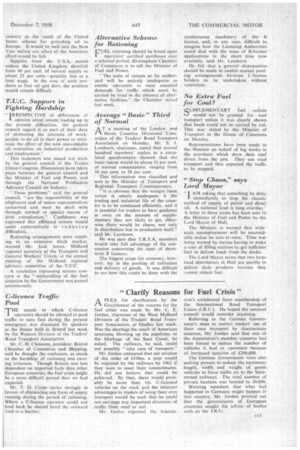"Clarify Reasons for Fuel Crisis"
Page 59

If you've noticed an error in this article please click here to report it so we can fix it.
APLEA for clarification by the Government of the reasons for the fuel crisis was made by Mr. C. E. Jordan, chairman of the West Midland Division of the Traders' Road Transport Association, at -Dudley last week. Was the shortage the result of American sanctions, blowing up the pipelines, or the blockage of the Suez Canal, he asked. The railways, he said, could not possibly "take care of transport."
Mr. Jordan estimated that net revenue of the order of .£100m. a year would be required by the railways by 1962 if they were to meet their commitments. I4e did not believe that could be achieved. By then, there would probably be more than Im. C-licensed vehicles on the road, and the inherent advantages to traders of using their own transport would be such that he could not envisage any important diversion of traffic from road to rail. •
Mr. Jordan regretted the Associa
Lion's withdrawal from membership of the International Road Transport Union (I.R.U.). He hoped the national council would consider rejoining.
Referring to the German Government's steps to restrict traders' use of their own transport by discriminate taxation, Mr. Jordan said that one of the Association's member concerns had been forced to reduce the number of vehicles it had in operation -because of increased taxation of £200,000.
The German Government were also seeking powers to reduce the maximum length, width and weight of goods vehicles to force traffic on to the Stateowned railways. The total number of private hauliers was limited to 20,000.
Warning members that what had happened in Germany might happen in this country, Mr. Jordan pointed out that the governments of European countries sought the advice of bodies such as the I.R.U.




























































































































